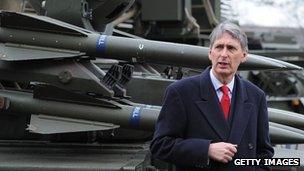Army to lose whole units under cuts, says Philip Hammond
- Published

Mr Hammond is to explain how the new smaller Army will operate.
Whole units of the Army will have to be cut but the regimental system will not be scrapped, says Defence Secretary Philip Hammond.
In a speech to military experts he said the future of the Army will involve "thinking innovatively about how combat service support is provided".
Under the Strategic Defence and Security Review, Army numbers will shrink from 102,000 to 82,000 by 2020.
Mr Hammond says there will be "difficult" decisions ahead.
He told an audience at the Royal United Services Institute: "A regular Army of 82,000 will have a different structure to one of 102,000. And some units inevitably will be lost or will merge."
Defence Secretary Philip Hammond: The smaller Army will be 'a highly equipped force'
Mr Hammond said "the history and the heritage" of some units delivered "tangible military benefits in the modern British army" and added: "So there is no question of abandoning the regimental system.
"But that does not mean that we can avoid difficult decisions as the Army gets smaller."
BBC security correspondent Frank Gardner said the speech at the annual Land Warfare Conference in London came ahead of a full announcement later this month.
Shadow defence secretary Jim Murphy claimed Mr Hammond had "increased uncertainty where clarity was needed".
He said: "We know the defence secretary's plans will mean regiments, jobs and traditions will be lost, but we have no answers for the military communities whose futures are in doubt.
"It will strike many as perverse, if not self-defeating, to sack 30,000 from the forces only to hire private contractors. The government plans to plug self-made capability gaps rather than reform our forces for the future."
But Mr Hammond said the Army would need to use "more systematically the skills available in the reserve and from our contractors".
Our correspondent says: "A total of £1.8bn is to be invested in the reserve forces, with a focus on certain niche areas such as cyber warfare, medical and intelligence."
The defence secretary said the UK's armed forces will need to operate better with other nations, like France and the US, in order to provide the necessary fighting "teeth".
It will mean "working closely with partners to operate logistics more rationally through alliance structures" and "looking to others to provide the tail, where Britain is concentrating on providing the teeth", he said.
"And in making those decisions, the military voice must prevail; ensuring that the Army remains the capable and agile force envisaged in the SDSR."
The changes will also "transform the role of reserve forces", he said.
"The Future Reserves must be structured to provide, as they do today, some niche specialists capabilities that aren't cost-effective to maintain on a full time basis," he added.
In the future light infantry battalions will be reinforced on deployment by reserve battalions, Mr Hammond said.
- Published18 October 2010
- Published14 May 2012
- Published20 March 2012